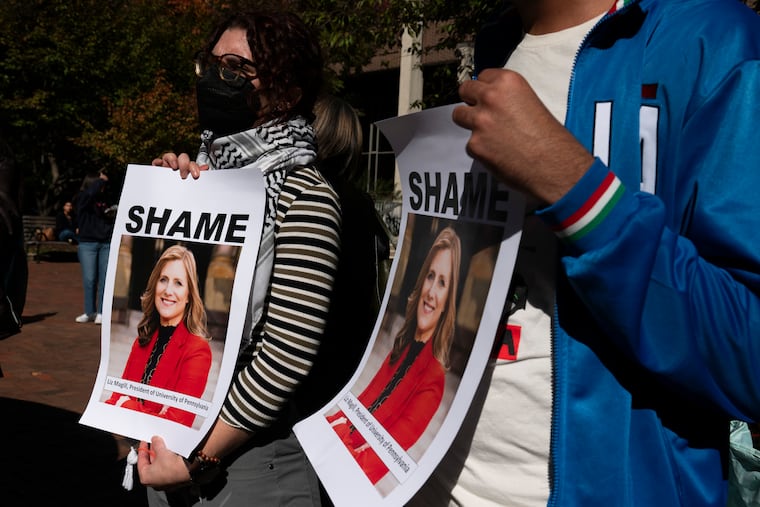It’s not the job of Penn and other universities to affirm our beliefs
All meaningful speech will hurt somebody’s feelings. A university's job isn't to protect us from that. It’s to educate us by exposing us to different points of view.

How are you feeling today?
And how did you feel about your university’s statement on Israel-Palestine? Did it make you feel seen, affirmed, and recognized? Did it acknowledge your pain? Or did it cause yet more hurt and anger?
Welcome to the “therapeutic university,” which has assumed responsibility for the emotional management of our students. But that’s not what universities like mine are for — our primary duty is to make people think, not to make them well. And when we substitute therapy for education, we lose our minds.
That’s the only way to understand what has happened on college campuses since the Oct. 7 Hamas attack on Israel. Universities released statements that left everyone wounded and unhappy: Jewish and conservative groups said the statements failed to sufficiently condemn Hamas, while Arab and left-leaning students faulted them for neglecting Palestinian suffering.
Then wealthy alumni got in on the act, pledging to stop giving money unless universities said the words they wanted to hear. At Penn, donors also called on president Elizabeth Magill to resign.
That triggered another bout of outrage on campus, where critics argued that the alumni were using their wallets to constrict free expression. “Let us be clear: academic freedom is an essential component of a world-class university and is not a commodity that can be bought or sold by those who seek to use their pocketbooks to shape our mission,” declared a statement from the chairs of Penn’s faculty senate.
But I haven’t heard anyone on the senate acknowledge the recent report by the Foundation for Individual Rights in Education (FIRE), which ranked the University of Pennsylvania second to last in the nation in its protection of open dialogue and exchange. Conservative students, especially, bite their tongues for fear of getting “canceled.” But now that left-leaning voices are under threat, professors are suddenly speaking up for free speech.
By contrast, billionaire private equity investor Marc Rowan did cite the FIRE study in his attack on “double standards” around speech at Penn. But he went on to condemn Magill for allowing “hate-filled” ideas about Israel to spread on campus. Got that? Penn is hostile to free speech, so we have to restrict speech that we think is hostile.
» READ MORE: The best DEI program: better college teaching | Jonathan Zimmerman
To add yet another irony, a letter released by several wealthy donors — including Rowan — called on Penn to implement “mandatory antisemitism awareness training across the university.” Never mind that FIRE has condemned mandatory diversity trainings if they require that everyone adhere to the same viewpoint, or that these trainings have a very poor track record in reducing bigotry. Indeed, despite all of their differences, most of the warriors in this battle shared the same premise: The university should affirm what they believe. Anything less will make them feel bad, which is the worst thing you can do.
That’s why universities have tabooed allegedly harmful microaggressions, despite the fact that some research suggests these terms cause less harm than many believe. It’s why they have established “bias response teams,” allowing anyone to anonymously report hurtful comments. It’s why some schools have provided “trigger warnings” about potentially traumatizing topics, even though the warnings don’t measurably decrease trauma and anxiety.
So perhaps we can use this heated moment to remind ourselves that all meaningful speech will hurt somebody’s feelings; if it doesn’t, it probably doesn’t mean very much. And the job of the university isn’t to protect us from these emotions. It’s to educate us by exposing us to a wide array of ideas — including those we find alien, insulting, or distasteful.
Let me be clear: A lot of people at our universities are hurting right now. I know that I am. Over the past two weeks, I’ve experienced fear, anger, and anxiety about the loss of lives in Israel and Gaza.
A lot of people at our universities are hurting right now.
And of course we should provide individual mental health services for anyone who wants them. But that’s different from the university taking official action to soothe our souls. In our time of anguish, we seem to want our educational leaders to say the magical words that will make us whole again.
They can’t, and they won’t, and they shouldn’t. Although I teach at Penn, I don’t really care what Elizabeth Magill has to say about Israel and Palestine. Magill isn’t our therapist-in-chief; she’s our president. Let her do her job.